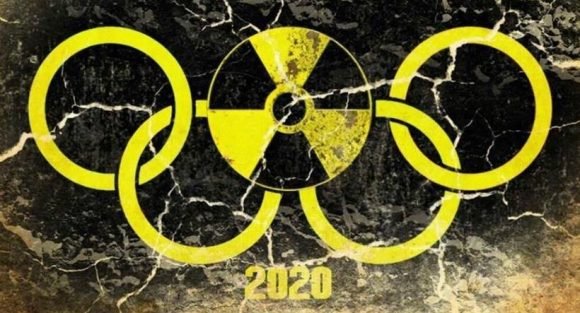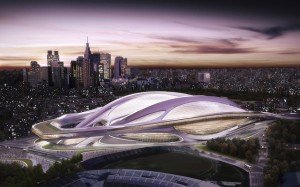The Cursed Olympics

By Fred Varcoe
When bones were discovered during construction on the new Olympic stadium in Tokyo, people said the Games could be cursed. It’s been a tough journey to 2021 and the cursed Olympics continue to suffer problems even as the 2020 Games start in 2021.
It’s not even Tokyo’s first cursed Olympics. There were also the 1940 Games that never happened. At the Nazi-led Berlin Olympics in 1936, the IOC in their wisdom decided to award the next Games to another militaristic, expansionist host: Tokyo. As with 2020, part of the selling point of the Japanese was to showcase Tokyo’s recovery from a devastating earthquake – the 1923 quake that levelled half the city. But, similar to 2020, the real reason was vanity and self-serving. Japan wanted to be accepted as a “first world” nation.
To this end, it figured it had to “reach out” to its neighboring countries, by attacking and colonizing them, starting with Korea. Japan’s much coveted men’s marathon gold medal in 1936 was won by a colonized Korean — Sohn Kee-chung — reluctantly representing his oppressors. In 1937, Japan initiated a war with China and this proved costly, literally. The government decided it couldn’t afford to wage war and host the Olympics, so it went with the choice it thought it would do better in – war – and informed the IOC that it no longer wanted to host the 1940 Olympic Games – but would be interested at a later date when it had finished subjugating East Asia. The Games were handed to Helsinki but were eventually cancelled due to the war in Europe.
Getting the 1964 Olympics so soon after waging an inhumane war against the world was, perhaps, another odd decision by the IOC, but it satisfied the organization’s remit to spread the Games around the world and enabled Japan to believe it was, or could be, a first-tier nation. Japan embarked on a massive modernization program, hoping to impress the world. In the end, Japan hosted a splendid and successful Games and achieved its goals. For the 2020 Games of 2021, the best Tokyo can hope for is survival.
While there was an inevitable wave of excitement after Tokyo was awarded the 2020 Games, a bumbling, incoherent government led by a bumbling, incoherent prime minister and a dithering, out-of-touch Games Organizing Committee led by a dithering, out-of-touch ex-prime minister led to a series of incomprehensible and almost comical decisions.
Arguably, the most egregious decision was made by then-Prime Minister and Olympic cheerleader Shinzo Abe when he scrapped the design of the new Olympic Stadium. Tokyo had chosen to go with a stunning design by world-famous and award-winning architect Zaha Hadid, an Iraqi-born British woman, to replace the 1964 Olympic Stadium, which was well past its sell-by date. Hadid’s design would have seen a beautiful, 21st-century stadium emerge in its place. It was the kind of stadium that Olympics are made for and it was perfect for Blade Runner Tokyo. Her design hit all the right buttons: spectacular, original, big, on budget. Well, on budget until it went out to tender to Japan’s extravagant construction companies. The costs ballooned, the media started to complain and Prime Minister Abe, sensing political capital, pulled the plug on the Hadid stadium. The job was handed to established Japanese architect Kengo Kuma – one of many who had complained about Hadid’s design – whose concept was so utilitarian, it has been likened to an oversized toilet.
But we’re getting ahead of ourselves. Tokyo’s bid was based on a number of falsehoods. The first, famously spoken by Abe, was that the problems surrounding the Fukushima nuclear plant were under control and that the Tokyo Olympics would be the “Recovery and Reconstruction Games,” with a special emphasis on Fukushima. He knew the problems surrounding the devastated nuclear plant were ongoing and unresolved, and the residents of the prefecture were still suffering, with thousands living in temporary housing. The cleanup of the nuclear plant will take at least 50 years. In April this year the government approved the dumping of over a million tonnes of contaminated water into the Pacific Ocean. Fukushima Prefecture got to host the first events of the 2020 Games, two days before the Opening Ceremony. As a sop to its years of suffering, it hosted a few baseball and softball matches at one of the most remote baseball stadiums in the country, in fact so remote there was a bear scare on the opening day.
The second major falsehood was that the climate in Tokyo in late July and August would be “moderate.” July, August and September are the hottest months of the year in Japan. And it’s very hot. In 2019, the temperature in Tokyo reached close to 41 celsius on July 23. In the six days before that, according to The Mainichi newspaper, 94 people died and tens of thousands had to be treated in hospital for heat-related problems. Such were the concerns of the organizers last year, they opted to move the marathon races – one of the premier events for Japanese sports fans – to Sapporo in Hokkaido, where they are hoping it will be cooler. But last year, Hokkaido, usually the coolest place in Japan, set a record temperature in May of 39.5 C, more than two degrees higher than the previous record. The 1964 Games took place in October for the simple reason that it is cooler then.
The actual bid and the budget were, unsurprisingly, wholly inaccurate. The initial estimate of costs was $7.5 billion. Last year’s postponement cost at least $3 billion and the official estimates now predict costs of $16 billion. Unofficially, the Games are likely to cost much more than that, possibly even double according to some estimates. Early on, Tokyo sought to cut costs by changing the bid outline and using existing or cheaper venues while obstinately refusing to trim the sports program. After initially considering an existing venue, Tokyo Governor Yuriko Koike agreed to build a new venue for volleyball, which is just around the corner from the new aquatics center. Other sports will use existing venues, some outside of Tokyo.
Due to COVID-19, spectators have been ruled out. A number of surveys in Japan have indicated that 60-80 percent of Japanese wanted the Games canceled or postponed, largely due to ongoing concerns over COVID-19. While Japan has suffered far less in the pandemic than other countries, this is seen by its citizens as more by luck than judgement. No one knows why the infection rate appears to be low in Japan, but with the Olympics approaching, that rate has risen sharply, putting pressure on a health system that isn’t designed to cope with a pandemic. Tokyo has been under a state of emergency for much of 2021, while in other parts of Japan, people were dying at home because of a lack of hospital beds. One hospital in western Tokyo put up posters demanding that the Games be canceled and these sentiments have grown stronger by the day. Japanese people are afraid the Olympics could turn into a super-spreader event and make a bad situation uncontrollable. To make matters worse, Japan’s vaccination program has been a disaster, with only 17 percent of the population getting fully vaccinated by July 7, compared to 48 percent in the United States and 52 percent in the United Kingdom.

The government of Prime Minister Yoshihide Suga has been under constant fire for seemingly putting the Olympics ahead of the welfare of Japan’s people. Whether true or not, the perception remains that the government were going to hold the Games at any cost. It didn’t help that the main liaison between the government and the Games had to resign. Former Prime Minister Yoshiro Mori stepped down as president of the Tokyo Organizing Committee in February after making inappropriate remarks about women. Mori may have been idiotic but he was a smooth conduit for the Organizing Committee to reach the ears of government. His replacement, seven-time Olympian and current lawmaker Seiko Hashimoto, does at least have Olympic credentials and one of her first moves was to add 12 women to the Executive Board.
But Mori wasn’t the only victim of bad judgement. Hiroshi Sasaki, the executive creative director for all four 2020 ceremonies, was also forced out after floating the idea of dressing up a well-known, plus-size entertainer as a pig and calling her “Olympig.” The Tokyo Organizing Committee of the Olympic and Paralympic Games Committee fired Kobayashi Kentaro as show director of the 2020 Opening and Closing Ceremonies two days before the Opening Ceremony for a joke about the Holocaust that he made 23 years ago. An early casualty in the Olympic process was the proposed logo for the Tokyo Games. Kenjiro Sano’s design turned out to be almost identical to that of the Théâtre de Liège in Belgium, so out went Sano and “his” design. Automaker Toyota announced it would not air TV commercials related to the Games in Japan. And in a follow-up to the stadium controversy, architect Kengo Kuma was accused of stealing the best bits from Zaha Hadid’s design, but the finished stadium was dull enough for people to realize that it was actually quite different.
Even nature wouldn’t cooperate with the Games. In August 2019, a Paralympic triathlon test event was canceled due to E. coli bacteria in the water, which was also close to the maximum allowable temperature. Triathletes who had managed to swim through Tokyo’s murky waters complained that it smelled like a toilet. Scientists and coaches suggested that the events should be relocated, but the Organizing Committee said measures would be taken to alleviate the problems before the Olympics.
While almost any major sporting event has problems – Rio, for example, had plenty – Tokyo has managed to shoot itself in the foot so often, it’s barely able to walk. Poor leadership and poor decisions have left the organizers with red faces on too many occasions. If the Tokyo Olympics are “cursed,” it’s been a self-inflicted curse.

